Medical Genetics
Overvıew About The Servıces Provıded By The Department:
At the Faculty of Medicine of Kocaeli University Hospital, the Department of Medical Genetics Laboratory was opened in 2006. In 2008, the laboratory was titled Licensed Diagnosis Center for Genetic Diseases by the Ministry of Health. Our department is the first center in our country to perform "Gene Expression Analysis with Gene Chips", and also the first center to start "array CGH Chromosome Analysis with Gene Chips" in our country and in some neighboring countries.
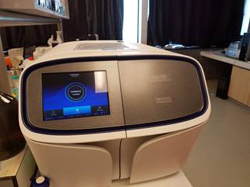
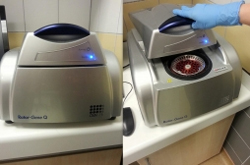
Our department, which is one of the most advanced genetic laboratory, is among the first study centers of "Liquid Biopsy" in our country. Cytogenetics, Molecular Cytogenetics, Advanced Molecular Diagnosis, Prenatal and Cancer Genetic Diagnosis Laboratories are equipped with the latest technology and allow the application of almost all known genetic methods in the diagnosis of diseases, from prenatal diagnosis to postmortem analysis. The laboratories and routine service areas in our department are as follows.
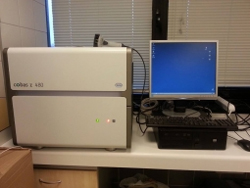
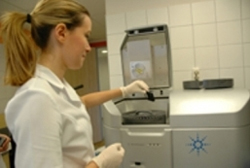
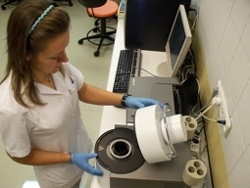
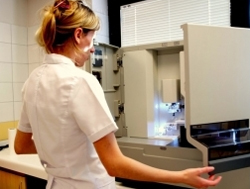
Cytogenetics Laboratory:
In the Cytogenetic Laboratory, cytogenetic tests are performed on peripheral blood materials taken from patients or their relatives, and chromosome analysis is routinely performed in order to diagnose genetic diseases due to structural and/or numerical chromosomal disorders after birth (postnatal).
Molecular Cytogenetics Laboratory:
In the Molecular Cytogenetics Laboratory, compared to routine conventional cytogenetic applications, Fluorescent In Situ Hybridization (FISH) and visual analysis systems allow us to analyze more cells more precisely and faster in postnatal diagnosis.
Advanced Molecular Sequencing and Karyotyping Laboratory:
In addition to our cytogenetic tests, DNA or RNA tests are performed with state-of-the-art New Generation Sequence Analysis, array-CGH, Sequence Analysis, Quantitative Real Time PCR devices in our center, which allows us to diagnose rare genetic disorders in patients or their relatives by examining the entire human genome more precisely and faster.
In our center, there is Next Generation Sequence Analysis-based gene panel for Childhood Epileptic Encephalopathies such as West syndrome, Dravet syndrome, Ohtahara Syndrome, Lennox-Gastaut syndrome, Doose Syndrome, Electrical status epilepticus in slow sleep wave, Malignant Migratory Partial Epilepsy, Early Myoclonic Encephalopathy. The following genes are analyzed in the panel:
ARX, CDKL5, SLC25A22, STXBP1, SPTAN1, SCN1A, SCN9A, KCNQ2, ARHGEF9, PCDH19, PNKP, SCN2A, PLCB1, SCN8A, KCNT1, ST3GAL3, TBC1D24, GNAO1, SZT2, GABRA1, PIGA, NECAP1, SLC35A2, DOCK7, HCN1, SLC13A5, KCNB1, GRIN2B, WWOX, AARS, SIK1, DNM1, KCNA2, EEF1A2, SLC12A5, ITPA, ALG13, FRRS1L, ARV1, SLC25A12, GUF1, SLC1A2, CACNA1A, GABRB3, UBA5, GABRB1, GRIN2D, FGF12, AP3B2, DENND5A, CAD, MDH2, SCN1B, SYNJ1, HNRNPU.
Whole Exome Sequencing (WES) analysis is also performed at our center to detect mutations in functional regions of the genome called exons. This test is recommended in cases when a clinical diagnosis cannot be made, the cause of the disease is not known by which gene to diagnose, and no mutations have been detected in previous genetic tests.
Before Birth (PRENATAL) Genetic Diagnosis Laboratory:
In our center, prenatal genetic diagnosis applications are performed by using advanced molecular karyotyping and conventional cytogenetic analysis technologies in amniocentesis / cordocentesis / fetal blood materials in order to give the chance to have a healthy child for patients with hereditary diseases and individuals with clinical indications.
Cancer Genetics Laboratory:
BRCA1/BRCA2 Gene Test
BRCA1 and BRCA2 genes help prevent uncontrolled cell division in normal cells. When dangerous changes, called mutations, occur in these genes, the risk of breast and/or ovarian cancer is greatly increased. According to risk calculations, while a woman's lifetime risk of developing breast cancer is 12% in the general population, this risk is around 60-80% in a woman with a dangerous BRCA1 or BRCA2 gene mutation. Again, according to risk calculations, a woman's lifetime risk of developing ovarian cancer in the general population is 1.4%, while this risk rises to around 15-40% in a woman with dangerous BRCA1 or BRCA2 gene mutations. In addition, dangerous BRCA1 mutations carry a risk for cervical, uterine, pancreatic and colon cancers; dangerous BRCA2 mutations also pose a risk for pancreatic, stomach, gallbladder, biliary tract cancers and melanoma. Mutations in the BRCA1 and/or BRCA2 genes also affect men. A man with a dangerous mutation in the BRCA2 gene is 80 times more likely to develop breast cancer by the age of 80 than a man without this mutation. A man with a dangerous mutation in the BRCA1 gene has a 7 times greater risk of developing prostate cancer than a man without this mutation. Tumor development can be prevented by the conservative surgical approach applied in individuals with mutations in the relevant gene.
Those who have breast cancer in two of their first-degree relatives (mother, sister, daughter) and in three or more of their first or second-degree relatives (grandmother, aunt); those with a family history of both breast and ovarian cancer, a first-degree relative with cancer in two breasts; those with a family history of breast cancer in a man; pancreatic, colon, and thyroid cancers with a significantly common family history are at risk of having mutations in the BRCA1 and/or BRCA2 genes. Individuals at risk should be evaluated for mutations in the BRCA1 and BRCA2 genes. In our Cancer Genetics Laboratory, mutations in the BRCA1 and BRCA2 genes are studied with the New Generation Sequencing method, which gives fast and reliable results in multigene tests.
Apart from breast and ovarian cancers, in addition to our cytogenetic and advanced molecular tests that can detect structural and/or numerical chromosomal abnormalities for leukemia, our center also has EGFR, BRAF, K-RAS, N-RAS tests, which are studied from pathology preparations using the Real Time PCR method.
Liquid Biopsy:
What is Liquid Biopsy?
Liquid biopsy is a new approach used to study cancer from blood. Studies have shown that very short DNA fragments broken off from tumors pass into the bloodstream. The liquid biopsy method allows obtaining an individual DNA map of the cancer using DNA particles circulating in the blood. The liquid biopsy test applied at Kocaeli University is a GENOME examination in which all genes belonging to cancer are taken into 'whole gene' analysis.
Liquid Biopsy Might be Applied to Who?
Liquid biopsy is used for individual planning and monitoring of treatment for people diagnosed with cancer. It may also be requested by physicians for early diagnosis in patients with suspected cancer. But liquid biopsy is not a social screening test and is performed in licensed molecular genetic diagnosis centers in patient groups decided by expert oncologists.
What are the Advantages of Liquid Biopsy?
- It has less risk for the patient than standard tissue biopsy.
- It is less painful taking samples from the patient.
- Provides a new option in cases where needle biopsy is difficult (for example, in some types of lung cancer).
- With this test, the increase or decrease of cancer DNA fragments or cells in the blood can be followed.
- It can be used to decide on the drugs to be used in the treatment of cancer patients, to follow the course of the disease and the response to the drug after treatment.
How Much Should I Pay for Liquid Biopsy?
Persons with SGK assurance do not need to make a special payment for this test if they are directed by their physicians to the Liquid Biopsy at Kocaeli University. Only during the clinical examinations, the examination fee is taken from them. When giving blood sample and at various stages of testing, patients will be given genetic counseling from the Medical Genetics Department Clinic.
What are the Sample Specifications to be Taken for Liquid Biopsy?
For liquid biopsy, it is sufficient to take a total of 30 ml of peripheral blood sample into tubes containing EDTA. Fresh blood sample is important for the quality of the study.
How long does it take to obtain the Liquid Biopsy test result?
The analysis of the high-density output obtained involves bioinformatics processes and the interpretation of the test can take from two weeks to two months depending on the size of the information obtained.
What is the contribution of liquid biopsy screening to health economics?
Because the results give an individual map, patients are protected from chemotherapies that would not benefit. Unnecessary use of high-cost oncology drugs and hospital care costs are reduced. Most importantly, precise measurement of drug response and dosing provides an increase in quality of life and prolongation of survival.
What is the concept of 'Individual Oncotherapy' provided by liquid biopsy?
Every person's genetic map is different. However, drugs act by entering through the doors opened by the genes in the cell. Using the liquid biopsy test, the type and dose of drugs are individually determined by mapping which cancer genes the patient carries.
What are the documents-sample and contact numbers required for the liquid biopsy test?
- Photocopy of identity card.
- Patient's address and two phone numbers.
- Pre-diagnosis of the physician requesting the test - signature and stamp.
- 30 cc blood -in tube with EDTA- (hemogram tube with purple cap), unfrozen.
Informatıon On How To Make An Appoıntment From Thıs Department:
You can make your appointments by calling our secretariat at (0262) 303 48 60 or by visiting our department, whose full address is given in the contact information.
Contact Informatıon:
Prof. Dr. Hakan SAVLI (Head of Department): (0262) 303 48 69
Secretariat: (0262) 303 48 60
Address: Kocaeli Üniversitesi Batı Yerleşkesi Yeni Araştırma Laboratuvarları Binası Kat: 1 Tıbbi Genetik AD. 41380 İzmit-KOCAELİ
Academic Staff:
• Professor.Dr. Hakan SAVLI (Head of the Department)
• Associate Professor. Dr. Naci ÇİNE
• Asst.Professor.Dr. Seda EREN KESKİN